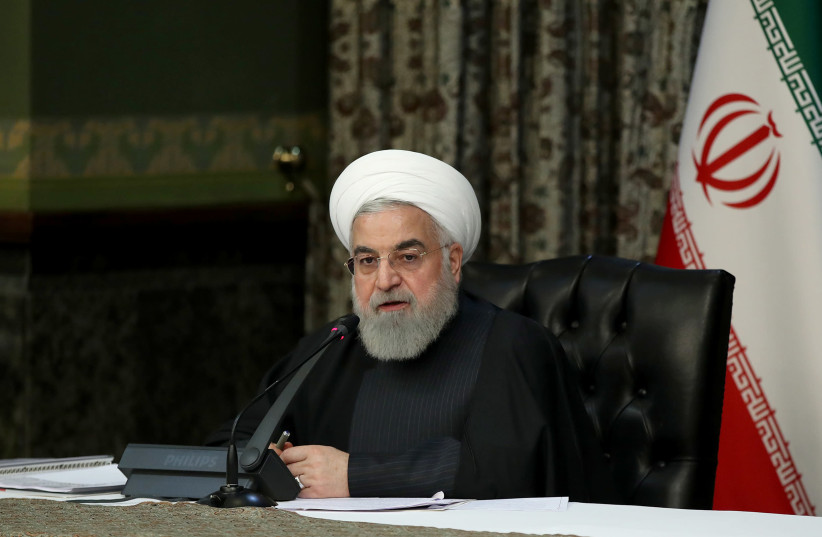Iran will hold two elections on Friday, one for its parliament and one for a key group that will likely select the country’s next Supreme Leader.
The two elections expect record low turnout for a number of reasons, the largest of which has been the regime’s systematic oppression of even moderate opposition groups, disqualifying even former presidents from running if they have not always toed the line preferred by current aging Supreme Leader Ayatollah Ali Khamenei.
Most prominently, Hassan Rouhani, president from 2013-2021, was disqualified from running.
Though he is generally a conservative and not part of the reformist opposition, he was still viewed as too independent thinking because he helped push through the 2015 Iran nuclear deal, which the regime now views as an error.
The vote will be the first formal gauge of public opinion after anti-government protests in 2022-23 spiraled into some of the worst political turmoil since the 1979 Islamic Revolution.

Critics from inside and outside the ruling elite, including politicians and former lawmakers, say the legitimacy of Iran's theocratic system could be at stake due to economic struggles and a lack of electoral options for a mostly young population chafing at political and social restrictions.
Khamenei has called voting a religious duty. He accused the country's "enemies" - a term he normally uses for the United States and Israel - of trying to create despair among Iranian voters.
Challenges of elections
But Iranians still have painful memories of the handling of nationwide unrest sparked by the death in custody of a young Iranian-Kurdish woman in 2022, which was quelled by a violent state crackdown involving mass detentions and even executions. Thousands of protesters remain in prison after what are viewed as sham-trials.
Economic hardships pose another challenge. Many analysts say that millions have lost hope that Iran's ruling clerics can resolve an economic crisis fomented by a combination of US sanctions, mismanagement, and corruption.
While establishment supporters will likely vote for hardline candidates, widespread public anger at worsening living standards and pervasive graft may keep many Iranians at home.
Prices for basic goods like bread, meat, dairy, and rice have skyrocketed in the past months. The official inflation rate stands at about 40%. Analysts and insiders put it at over 50%.
US sanctions have hit Iran's economy hard. Efforts to revive the pact have failed.
Iranian activists and opposition groups are distributing the Twitter hashtag #VOTENoVote widely on social media, arguing that a high turnout will legitimize the Islamic Republic.
With heavyweight moderates and conservatives staying out of Friday's race and reformists calling it an "unfree and unfair election," the vote will pit hardliners and low-key conservatives against each other, all proclaiming loyalty to Iran's Islamic revolutionary ideals.
The interior ministry said 15,200 candidates will run for the 290-seat parliament. Though a vetting body called the Guardian Council approved 75% of initially registered hopefuls, it disqualified the vast majority of meaningful challengers from potential opposition groups.
The unelected Guardian Council, made up of six clerics and six legal experts generally within Khamenei's orbit, has the authority to scrutinize laws and election candidates.
Ballots will mostly be counted manually, so the final result may not be announced for three days, although partial results may appear sooner.
On the same day, Iranians also vote for the Assembly of Experts, which appoints and can dismiss the supreme leader. The 88-member clerical body rarely intervenes directly in policy but is expected to help choose the 84-year-old Khamenei's successor.
Polling has projected turnout of about 41%, while former lawmaker Mahmoud Sadeghi said on Monday that surveys showed the participation could be as low as 27%, significantly lower than 42% in a 2020 parliamentary vote.
The Reform Front coalition has said it will not take part in the "meaningless" election but has not boycotted the vote.
From 1997-2005 and again from 2013-2021, Khamenei experimented with Iranian presidents who were reformists and pragmatists, Mohammad Khatami and Hassan Rouhani respectively.
Although Rouhani was still in power in 2020, by that time the US had pulled out of the Iran nuclear deal which was a signature policy of Rouhani’s, and Khamenei had already decided to cut anyone other than hardliners out of future power.
For the 2020 Iranian parliamentary elections, Khamenei not only disqualified reformists, the closest Iran has to a group which believes in some western-values, who had been disqualified from running for years.
Rather, he started to also disqualify pragmatists, whose bedrock values were as anti-western as Khamenei’s hardliners, but who believed that trying to reach deals with the West to improve relations was a tactical imperative.
This continued in the 2021 presidential election of hardliner and Khamenei favorite, Ebrahim Raisi, with the shocking disqualifications of top Iranian officials First Vice-President Eshaq Jahangiri and former parliamentary speaker Ali Larijani from running for office.
These moves and the banning of hundreds of other candidates by Khamenei, or technically by his Guardian Council, which does his bidding in banning undesirable candidates from running, brought voter turnout down to record lows.
While some areas still reached 40% or more in voter turnout, some areas had single digit voter turnout, as compared to 70% voter turnout in 2017.
At a collective level, whereas Raisi lost the 2017 election to Rouhani (back when Khamenei was still allowing partially free elections) by around 23.6 million to around 15.8 million, Raisi’s “win” in 2021 saw him only rise to 18 million.
In other words, had all the voters who voted in 2017 voted again, Raisi still would probably have lost by a couple million votes.
He only won because he had no real opposition and an artificial coerced drop in voter turnout.
Many reformists and pragmatists have been critical of Iran’s role in Syria’s civil war during the 2010s and other adventurous violent moves, such as the recent missile attacks on adversaries in Iraq, Syria, and Pakistan.
Reuters contributed to this report.
